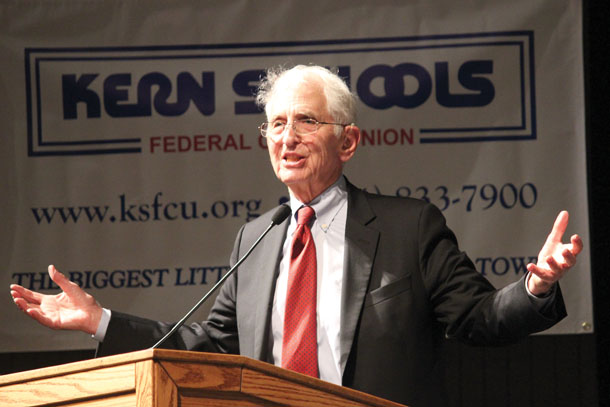Notoriously known whistle-blower Daniel Ellsberg, 84, visited the Cal State Bakersfield Doré Theatre to present “Why the United States Needs More Edward Snowdens,” as part of the 29th annual Charles W. Kegley memorial lecture on April 14.
Ellsberg, most notably recognized for serving as an anti-war activist and for leaking documents revealing U.S. policy in the Vietnam War known as the “Pentagon Papers,” arrived to a full house during his evening memorial lecture.
Ellsberg started off the lecture speaking about a recent investigation done by USA TODAY which revealed that the U.S. government began collecting records of international telephone calls made by Americans nearly a decade before the Sept. 11 attacks.
Ellsberg went on to state that the U.S. government’s role, as revealed in the investigation, was in direct violation of the Fourth Amendment constitutional rights.
Having been illegally wiretapped and robbed of his privacy rights himself, Ellsberg has been a victim of such direct violation of the Fourth Amendment, “I was overheard on warrantless wiretaps, which were then clearly illegal and unconstitutional, and that was a factor in facing President Nixon with impeachment and probable prosecution, which lead to his resignation,” Ellsberg stated.
Ellsberg continued with the reality of exemption within the executive powers reiterating a famous Nixon quote, “when the president does it, it is not illegal.”
Ellsberg revealed that former Vice President of the United States Dick Cheney, who worked in the White House during President Nixon’s administration, defended such exemptions during the time of his trials in the 1970s. “Cheney has constantly said that the president is being too trammeled by Congress and by these laws; he was clear at the time, that Nixon should not have faced impeachment and that the people who were put in jail for breaking the law, in some cases against me, in Nixon’s case almost exclusively against me, should not have been tried because they were working for the president.”
Even though Ellsberg focused most of his lecture bringing awareness to the Fourth Amendment, he did defend the legitimacy of the United States constitution and the oath taken by government officials, “The oath is not to secrecy, and in our country it is not to the president…it’s an oath to defend and support the constitution of the United States,” he stated.
Ellsberg dedicated the final piece of his lecture to Edward Snowden; a National Security Agency sub-contractor notably known for leaking top-secret information that disclosed intrusive spying practices used on American citizens to various media outlets.
Ellsberg defended Snowden amid the fact that, unlike Ellsberg himself, he didn’t stand to face trial in the U.S. and instead left the country to seek asylum in Russia.
“Snowden, I have no doubt, was in danger when they were looking for him. He could not have put that information out and explained it, as he has been doing it for the past two years, had he stayed in his country because he would be in an isolation cell like Chelsea Manning and he would be there for the rest of his life, he would never get out,” said Ellsberg.
Ellsberg continued to defend Snowden explaining the faults of the Espionage Act and how it prevents whistleblowers, like both himself and Snowden, from presenting reason for their acts, no evidence nor testimony would be allowed to be disclosed to a jury.
“A whistleblower can not get…a fair trial under the Espionage Act”, Ellsberg said, “I didn’t have one either, but I got out on a miracle of exposure of the president’s crimes against me.”
Ellsberg concluded his lecture promoting the need for people such as Snowden and encouraging government officials to speak up. “ If there would have been any Edward Snowdens in the high circles of the American governments in 2001, 2002 and early 2003 to reveal what many people knew was a secret of deceptive, aggressive and hopeless invasion…we wouldn’t have killed a couple of million Iraqis and several thousand of Americans,” Ellsberg said.
Ellsberg was dismissed to a cheering crowd and a standing ovation. He remained on stage to answer questions for the audience.


